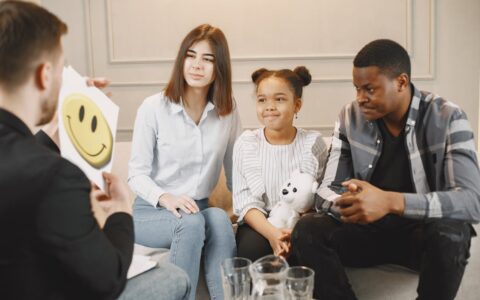Starting Counseling for Kids: First Steps
California Christian Counseling
Therapy is a type of treatment for the problems many kids and teenagers experience, including issues that impact what and how they think, act, learn, and speak. Counseling for kids is a way to help the child in your care.
What is counseling for kids?
A key benefit of counseling for kids is that by going to therapy sessions, kids talk about and learn how to work out their problems. By taking a closer look at their problems in a gentle way, they can communicate about them better and deal with them more effectively.
How do therapists help with personal problems?
Trained counselors and therapists are professionals who are equipped to assist people with a wide variety of problems. Some typical examples of these problems are experienced by kids and teens going through a hard time – such as when their parents are going through a divorce, there are bullying problems at school, or if the child has health problems.
Counseling for kids is also helpful for children as they try to process powerful emotions, perhaps feelings of anger, sadness, worry, grief, or low self-esteem.
Typical conditions dealt with during counseling for kids
Counseling is remarkably effective with a wide variety of disorders. A short list of these will include the following conditions:
- Trauma-related disorders (Post-Traumatic Stress Disorder, acute stress disorder)
- Disruptive behavior disorders (bullying, lack of respect, destructive behavior)
- Self-harm (cutting)
- Eating disorders (anorexia, bulimia, or binge-eating disorder)
- ADHD (Attention Deficit Hyperactivity Disorder)
- Depression
- Obsessive Compulsive Disorder (OCD) and anxiety
Why is counseling for kids necessary?
 Like adults, kids and teenagers require therapy when they experience problems that they cannot cope with alone. Problems that affect how they feel or act, or how well they do, need to be noticed and taken care of. If they are not getting better on their own, then counseling for kids is often a helpful remedy. It is sometimes the case that the whole family unit requires therapy too while learning to communicate and create healthy boundaries with one another.
Like adults, kids and teenagers require therapy when they experience problems that they cannot cope with alone. Problems that affect how they feel or act, or how well they do, need to be noticed and taken care of. If they are not getting better on their own, then counseling for kids is often a helpful remedy. It is sometimes the case that the whole family unit requires therapy too while learning to communicate and create healthy boundaries with one another.
Is counseling for children effective?
In therapy, as in life, we learn by doing, and counseling for kids is no different. When counseling younger children, it is often effective for the therapist or counselor to work with the whole family in various ways, including drawing, playing, and talking.
With an older child or teenager, therapists can teach skills and techniques to help them in specific areas. Counselors can facilitate conversations to help teens talk through their feelings and come to grips with their problems.
Counselors provide a constructive and nurturing learning environment, assisting children to improve their self-image and discover and celebrate their strengths. Counseling for kids helps children build healthy thinking patterns and habits of speaking, thinking, and acting.
Sometimes the counselor may meet with both parent and the child, and other times meet along with the child. This will often depend on the age of the child. Your child’s counselor may also suggest meeting with just the parents to teach and advise how to help their child in the home.
What to expect during the counseling session
Initially, your counselor will interview you and your child. These times are characterized by questions from the counselor who will then listen closely to the answers. This process will enable the counselor to better understand your child, their context, and the problem(s) they are facing. The counselor will also tell you how they expect to be able to help.
During the follow-up counseling sessions, your child will likely do several of the following activities:
Talking: Expressing feelings through talking is a healthy way to process feelings. As your child’s counselor shows your child they can listen and hear what the child is saying, this builds trust and enables the child to learn.
Learn new skills: Counselors often use activities to make patients aware of their feelings and resilient coping skills. Drawing and playing are effective learning methods, and mindfulness and breathing techniques are effective practices to deal better with stress.
Practice problem solving: With older kids and teens, the counselor may explore how problems at home affect them. There may be a discussion on how to find a solution to these problems. Games may be used to help show kids how to use self-control and practice patience, deal with disappointment, follow directions, listen, and be assertive instead of aggressive.
Understanding why counseling for kids can be useful
Coming to understand the need and requirement of counseling for kids can be a significant journey. If you are looking for additional help to properly understand this and make a good decision, contact our office to chat with our reception team. We would be happy to answer any questions you may have.
“Family Therapy”, Courtesy of Gustavo Fring, Unsplash.com, CC0 License;




